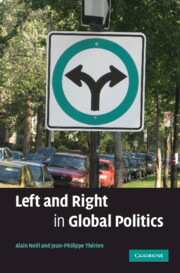Book contents
- Frontmatter
- Contents
- List of tables
- List of figures
- Acknowledgements
- Introduction
- 1 A clash over equality
- 2 A worldwide value divide
- 3 Two tales of globalization
- 4 The rise of the modern state system (1776–1945)
- 5 The age of universality (1945–1980)
- 6 The triumph of market democracy (1980–2007)
- 7 Twenty-first-century rapprochement
- 8 The core currency of political exchange
- Conclusion
- Index
- References
Conclusion
Published online by Cambridge University Press: 05 September 2012
- Frontmatter
- Contents
- List of tables
- List of figures
- Acknowledgements
- Introduction
- 1 A clash over equality
- 2 A worldwide value divide
- 3 Two tales of globalization
- 4 The rise of the modern state system (1776–1945)
- 5 The age of universality (1945–1980)
- 6 The triumph of market democracy (1980–2007)
- 7 Twenty-first-century rapprochement
- 8 The core currency of political exchange
- Conclusion
- Index
- References
Summary
Politics involves distinct social mechanisms, which cannot be adequately captured by the sociological notions of structure and culture, or by the economic concepts of rational choice and equilibrium. Some political actions are driven by social norms, and others by utilitarian calculations, but political life always contains an additional dimension: communication. Political scientists sometimes convey this distinction by speaking of a logic of arguing that exists alongside a sociological logic of appropriateness (norms) and an economic logic of consequentialism (utility). When they argue, social actors can challenge prevailing norms and the dominant rationality, and transform society as they communicate and deliberate. Economist Albert Hirschman once made a similar distinction by contrasting the market, where one exercised choice through “exit” – by not buying – and politics, where “voice” and protest were the prevailing modes of operation. Likewise, Jon Elster distinguished the market, where private preferences were expressed through purchases, and the forum, where an open and public conversation brought people to determine together the common good and the meaning of social justice.
This deliberative dimension of politics is perfectly captured by the left–right opposition. Whereas the core concepts of economics translate into an instrumental rationality that tends to “close off debate,” the left–right division, understood as the core currency of political exchange, suggests instead that debates are unavoidable, inherent in political life, and foundational for democracy.
- Type
- Chapter
- Information
- Left and Right in Global Politics , pp. 231 - 235Publisher: Cambridge University PressPrint publication year: 2008

